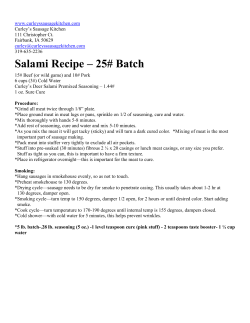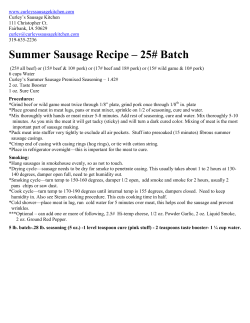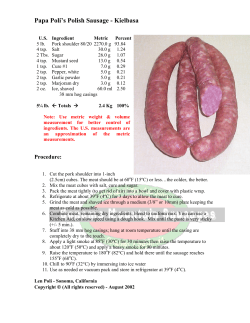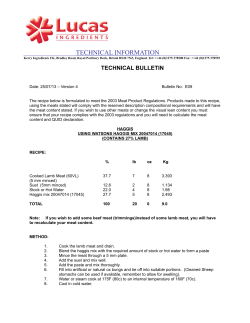
DO FDE SERVEAGRILLIN ?
A D part from butter, no food has been demonised to such an extent over the last few years as red meat and beef in particular. Indeed, beef has been blamed for causing colon cancer, breast cancer and heart disease. However, a serious examination of this issue obliges us to challenge any such claims.20 ESERVE A GRILL D F E E ING SB E ? O Shall we send our cattle to hell? Beef is accused of being responsible for the explosion in cases of obesity. Let’s take a look at what the statistics say : In Belgium : • It has been proved that the frequency of obesity has considerably increased in Belgium during the last two decades1. However, over the period from 1980 to 2001, a drop of more than 30% in beef consumption can be observed2. How can this antagonistic trend be explained? How can the increase in obesity be explained, if the phenomenon generating it is in decline? Why not take into consideration the increase by more than 144% between 1980 and 2005 of consumption in Belgium of soft drinks3 to explain this explosion in cases of obesity? • The survey into food consumption in Belgium reveals that obese people and inactive people or those indulging in minimal physical activity normally eat lower amounts of meat-based products4. What’s more: • This irrefutable fact is transposable to Europe which has reduced its consumption of beef by 10% in 10 years5, whilst recording an increase in cases of obesity6. • Germany in particular displays the highest proportion in Europe of overweight people7. However, individual consumption of beef in Germany is the lowest in the first 15 EU Member States5. Industrial .........................or ........................traditional? Is red meat a cause of cancer? No, red meat is not carcinogenic per se . Cancer is a disease of industrialised countries and many factors can be involved: modified vegetable fats, industrially processed food, etc. Effectively, industrialised countries consume a lot of meat; it is therefore possible to associate the two types of factors. However, association does not mean causality: the countries which have the most television sets per capita also have the highest levels of cancer, which does not mean that televisions cause cancer20! The hypothesis that a vegetarian diet is an efficient means of preventing cancer seems more and more improbable. On the contrary, consumption of meat holds more benefits than risks8. And what about the above statement in particular with reference to cancer of the colon? The first claims made against meat with regard to colon cancer risk date from 1975. More than 30 years later, in spite of the energy and money invested to study this problem, it is still not known whether meat is at issue: epidemiological studies provide incongruous responses and the results of experiments on animals are mostly negative9. Furthermore, analysis of statistics seems to rebut this accusation : • In the UK, consumption of red meat decreased by 25% between 1963 and 1998; yet, the number of colorectal cancers increased during this period! Is it possible to pin the responsibility for the increase in these cancers on meat? Most certainly not. However, over the same period, a decline in the consumption of vegetables and cereals can be observed, which is in a direct relationship with the increase in the number of such cancers10! • If consumption of beef was responsible for the formation of colorectal cancers, how can it be explained that the Hungarians have both the highest death rate due to cancer11 and the lowest consumption of beef in the first 25 Member States of the EU12? • According to this theory, with a consumption of beef at 70 kg per annum and per capita13, Argentina should have the highest rates of this cancer. Nonetheless, this is not the case: the highest rates can be observed in the countries in North America, Europe and Oceania. On the contrary, this cancer is rare in South America9. Argentina : Yearly consumption of beef : 70kg per annum per capita13 Life expectancy: 77 years14. The claimed relation between eating meat or dairy products and breast cancer has also been rejected by the University of Harvard after analysis of various studies covering this subject15. This confirms the results of the Imperial Cancer Research Fund, which was not able to highlight differences between vegetarians and nonvegetarians with regard to death rates linked to colorectal, breast, prostate, stomach or lung cancer16. Actual nutritional problems : The population of Europe has iron, selenium, folate and vitamin B12 levels below the recommended thresholds. For some of these micro-nutrients, it is a major problem (e.g., iron: 66 to 80% of the world’s population is below recommended levels, with nearly 30% of the world’s population suffering from anaemia)8. Such being the case, these folates, vitamin A, selenium and zinc are micro-nutrients whose efficiency in preventing cancer is more than probable. Consequently, it is often put forward that diets that do not include much fruit or vegetables increase the risk of developing cancer due to insufficient folate intake. Why would these compounds be less efficient if they are taken in via meat, especially since it is proved that their bio-availability is better17? Furthermore, even amongst a population with traditional food habits, the desirable thresholds for these micronutrients are not always reached. And whilst some vegetables are rich in iron, vitamin A, etc., they are not necessarily always a good source. Red meat should be eaten 3 to 4 times a week In conclusion, a varied and balanced diet, including meat products, is the best way to ensure a sufficient level of intake of all the essential elements which also contribute to preventing cancer8,17. Aware of the genuine public health problems affecting the population, the Australian government recommends in its food guide for adults to eat red meat 3 to 4 times per week18. Meat and heart disease : Cardio-vascular diseases have been linked to diet, in particular the consumption of lipids. It is true that the world consumption of lipids has been increasing by 3.5% per annum since 1962. However, the consumption of animal fats has decreased by around 1% per annum over this same time period. The increase observed in the consumption of total lipids can therefore be explained by the rise in consumption of vegetable fats. With a yearly growth of 7.88% since 1962, in 2004 palm oil accounted for more than 22% of total consumption of lipids. In comparison, animal fats represent 6%19. As such, these vegetable oils are often consumed after hydrogenation. This treatment results in the formation of trans fatty acids which unquestionably have adverse effects on cardio-vascular health and are associated with diabetes20. Consequently, in every day diets, the great majority of total trans isomers come from partially hydrogenated vegetable oils, used to prepare many food products20,21. Whilst it is true that the ruminants’ digestive process involves production of natural trans fatty acids, they are consumed in very low quantities and various studies have demonstrated that their consumption does not have any consequences on cardio-vascular health22,23. Throughout the world, various century-old people have been studied. Without being able to dismiss, in certain cases, a possible influence of genetics, it seems that diet is the key factor in explaining their remarkable longevity. However, contrary to what some people would have liked to have imagined, the people studied had not given up meat. There was, however, one common point: the groups studied seem to have all maintained a diet free from partially hydrogenated fats20. Since 1st January 2008: banishment of “trans” fats from restaurants and fast-food outlets across the USA – Calgary, New York, Los Angeles, etc. Why is red meat important in my diet? • Because it plays a central role in nourishment, making a major contribution to the intake of 24: • Energy. • First-rate proteins, containing all the essential amino acids in suitable proportions, including amino acids not found in vegetables. • Vitamin A, essential for the eyes and immune system. • Vitamin B1. • Vitamin B2. Virility, growth, nervous and respiratory functions, prevention of cardio-vas • Niacin (vitamin B3). cular risks, control of anxiety, prevention of in utero deformation risk, etc.; • Vitamin B6. the range vitamin B is absolutely vital25. • Vitamin B12. • Vitamin D, guaranteeing solid bones and protecting against cardio-vascular disease26. • Selenium, which stimulates the immune system. • Iron, which prevents anaemia. • Zinc, a major player in cell growth. • Because the human digestive tract is designed for an omnivorous diet and consequently can digest meat easily.20 • Because, in light of the richness and availability of these nutrients in meat, the Australian Dieticians’ Association considers it to be a basic foodstuff for children and teenagers24. • Because removing animal products from your diet increases the risk of developing certain nutritional deficiencies27,28,29. 1: Kolanowski, Epidémiologie de l’obésité en Belgique- Louvain Med. 119:S273-S275, 2000. 2: Dusquesne et al, Evolution de la consommation de viande bovine en Belgique - Rencontre Recherche Ruminants, 2003. 3: Observatoire Bruxellois de la Consommation Durable, Vive l’été sans boissons sucrées, 2007. 4: Institut Scientifique de Santé Publique, Enquête de consommation alimentaire Belge 1, 2004. 5: Chatellier et al, la consommation de viande bovine dans le monde et dans l’Union européenne : évolutions réce,tes et perspectives - INRA prod. Anim., 16(5), 381391; 2003. 6: World health Organization, The challenge of obesity in the WHO European Region - Fact sheet EURO/13/05, 2005. 7: International Association for the Study of Obesity, Adult overweight and obesity in the European Union (UE25), 2007. 8: Nohr et al : « Mealthy » food : meat as a healthy and valuable source of micronutrients’, Animal (2007), 1: 309-316. 9: Gearldine Parnaud, Colorectal cancer : controversial role of meat consumption – Bulletin de cancer, vol 84, n°9, 899-911, 1997. 10: Hill, Meat, cancer and dietary advice to the public - European Journal of Clinical Nutrition, 56 :36-41, 2002. 11: World Health Organization, Highlights on health in Hungary, 2004. 12 : Ernst & Young, Evaluation des mesures de marché dans le secteur de la viande bovine : rapport final, 2007. 13: Programa de las Naciones Unidas para el Desarrollo, Caracterización de la Producción Ganadera en Argentina frente al Cambio Climático : http://www.undp.org. ar/docs/prensa/brief-05-cambios.pdf. 14 : http://www.statistiques-mondiales.com/argentine.htm 15: Missmer et al, Meat and dairy food consumption and breast cancer : a pooled analysis of cohort studies - International Journal of Epidemiology, 31:78-85;2002. 16: Key et al, Mortality in vegetarians and nonvegetarians: detailed findings from a collaborative analysis of 5 prospective studies - American Journal of Clinical Nutrition, 70(suppl):516s-24s; 1999. 17:Biesalski et al, Meat and cancer : meat as a component of a healthy diet - European Journal of Clinical Nutrition:56,Suppl 1,S2-S11;2002. 18: National Health and Medical Research Council (Australain Government) - Dietary Guidelines for Australian Adults (2003). 19: Basiron et al, Vision 2020, The palm oil phenomenon - malaysian Palm Oil Board (2005) 20: Arickx*, Cholestérol ou graisses hydrogénées, qui est le coupable - Ed. M. Pietteur; 2008. (* biochimiste, ancien cadre de Recherches et Développement chez GlaxoSmithKline) 21: Mozaffarian et al, Trans Fatty Acids and Cardiovascular Disease - The New England Journal of Medicien 354:1601-13, 2006. 22: Jakobsen et al, Intake of ruminant trans fatty acids and risks of coronary heart disease - International Journal of Epidemiology, 37:173-182 (2008). 23: Motard-belanger et al, Study of the effect of trans fatty acids from ruminants on blood lipids and other risk factors for cardiovascular disease1-3 - American Journal Nutrition87:593-599, 2008. 24:Cleghorn, The role of red meat in meeting the nutritional challenges during the life stages - Nutrition & Dietetics, 64:S143-146, 2007. 25: Agence Française de Sécurité Sanitaire des Aliments : http://www.afssa.fr/index.htm 26: Wang et al, Vitamin D deficiency and risk of cardiovascular disease - Journal of American hearth Association : http://circ.ahajournals.org/cgi/reprint/CIRCULATIO NAHA.107.706127v1, 2008. 27: Casella et al, Vitamin B12 deficiency in infancy as a cause of developmental regression - Brain & development 27:592-594, 2005. 28: Larsson et al, Dietary intake and nutritional status of young vegans and omnivores in Sweden - American Journal of Clinical Nutrition, 76:100-106, 2002. 29: Craig, Health effects of vegan diets1-3 - American Journal of Clinical Nutrition, 89:162S-33S, 2009. Written by Herd-Book BBB ASBL with the support of APAQ-W
© Copyright 2025









